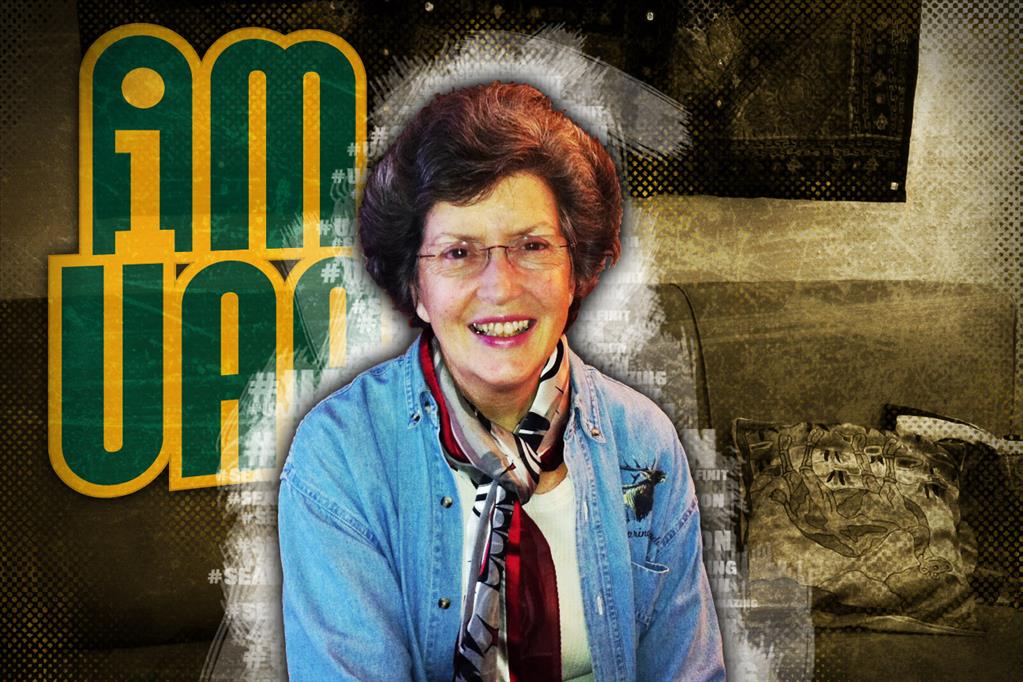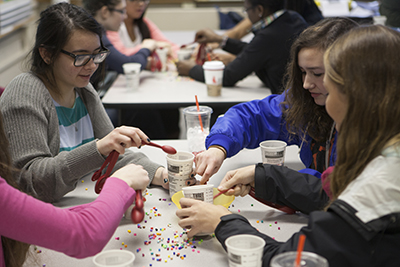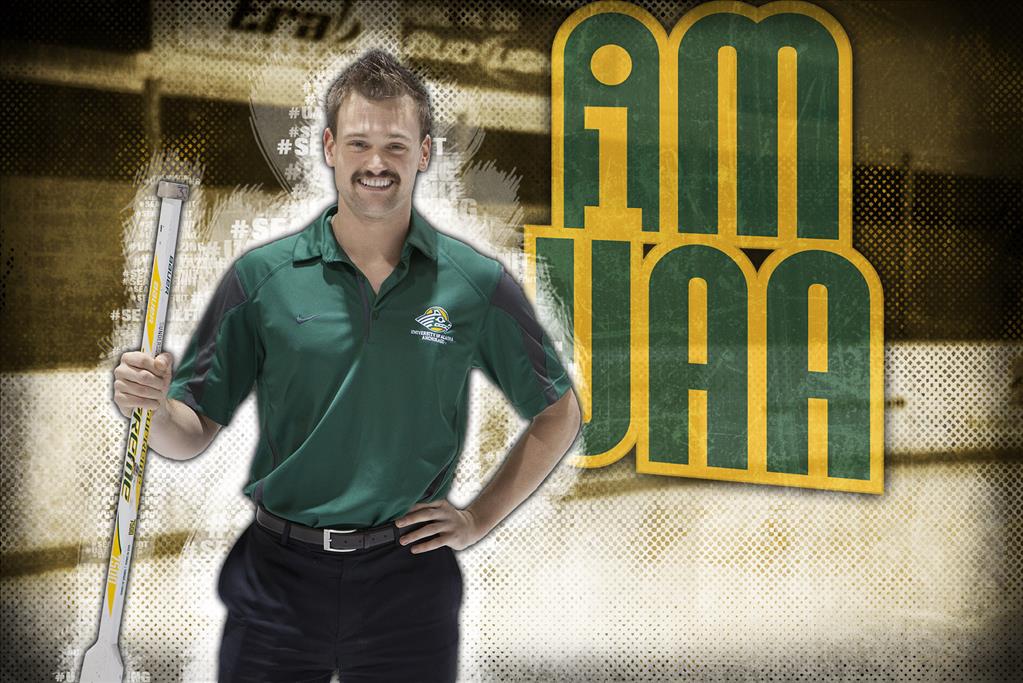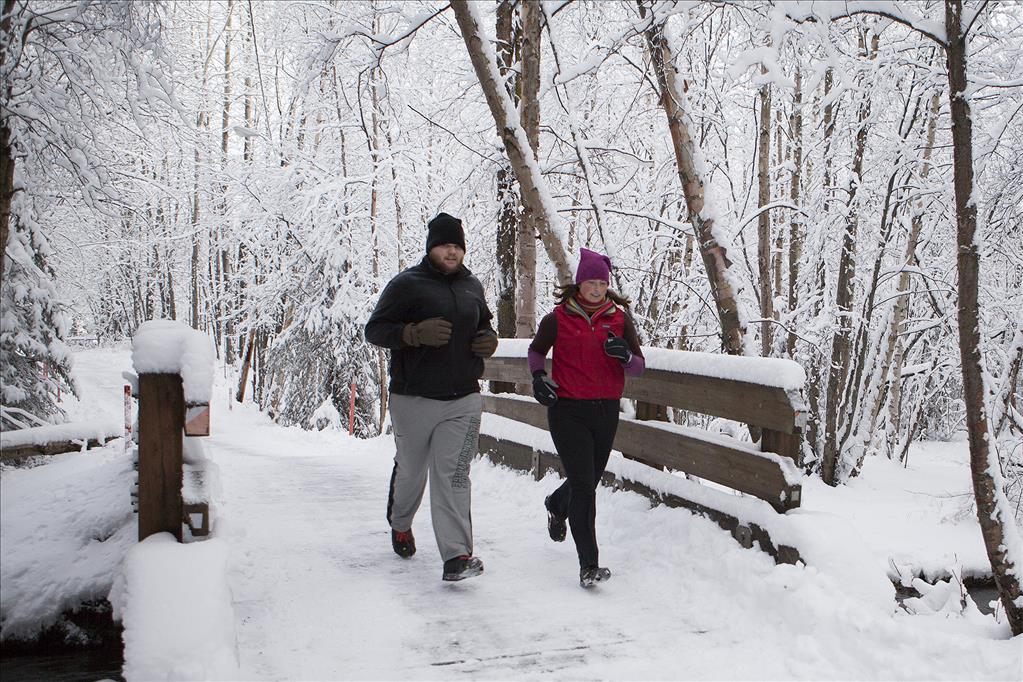Faculty Spotlight: Becky Patterson Bunde
by Tracy Kalytiak |
 Professor emerita, English
Hometown: Loveland, Colo.
Fun Fact: Becky has visited every continent except Antarctica.
Professor emerita, English
Hometown: Loveland, Colo.
Fun Fact: Becky has visited every continent except Antarctica.
Sometimes people choose the traditional route when seeking an education: They earn a high-school diploma, immediately delve into college courses and then emerge with a bachelor's degree after an uninterrupted four years of study.
Others, however, take scenic routes to that degree.
It can be wildly difficult for a university student to manage a load of calculus, business or literature courses while meeting the demands of a full-time job, sick toddlers and obligations like rent and finding money for tuition.
Becky Patterson Bunde, a professor emerita who taught English for 30 years at Anchorage Community College and the University of Alaska Anchorage, recently created a scholarship to help these nontraditional students find solid financial footing during their quest for a degree.
"Nontraditional students have had life happen to them, and those students are so motivated," Becky said. "There are lots of scholarships for 18-year-olds, but this scholarship is more unique. Of all people, they need to have someone say they believe in them."
Becky gave UAA a $25,000 endowment and will add $1,000 to that endowment every year, forming the basis of the Becky Patterson and Murphy Turner Endowed Scholarship. The scholarship will provide financial assistance for tuition and other related educational expenses to motivated nontraditional students, to complete their undergraduate degree at UAA. After Becky's death, the university will receive 80 percent of her IRA; interest from that account will pay tuition, books and associated expenses for students receiving the scholarship.
Nurturing an idea
Becky hails from Loveland, Colo. She attended Colorado College, graduated from the University of Colorado and then moved up to Anchorage to teach 10th-grade English at West High.
"I've lived in Alaska basically since 1967," she said. "I came because of the adventure, absolutely the adventure. In 1967, it was kind of at the end of the world. Calls were really expensive; TV came a week late. People told me, 'Aren't you worried [about another big earthquake]?' and I said, 'They've already had it.'"
Becky returned to her home state to earn her master's degree from Colorado State and came back to Alaska to teach English at ACC. She later earned a doctorate degree.
Becky met her first husband, Robert "Murphy" Turner, at a ski party and they married in 1975. Turner managed Pacific Fruit and Produce Co. while his wife worked at ACC and UAA.
The couple loved to explore.
"We traveled all over the world, often snorkeling or going off the beaten path," she said. "In Holland, for example, we just hopped on a bus, having no idea where it was going and when we got out in some little town, we stepped right into a fantastic music celebration that was only held once a year. In Jordan, we walked into the slot canyon leading to Petra and were the only ones in this magical entryway to such a famous sight."
Becky donated $5,000 to UAA for a scholarship-"a one-time deal"-after she retired in 1999.
Then, Becky accepted a teaching position in the United Arab Emirates for what she thought would be a year. "I taught the first generation of Muslim women to be college educated in that country," she said. "We stayed almost five years because we fell in love with the people and the country."
The couple returned to the U.S. and found a new home in Anchorage, but chose to stay with Becky's parents in Colorado after doctors in San Francisco diagnosed Turner with Creutzfeldt-Jakob disease. He was only 60 years old when he died in June 2005.
That November, fellow UAA professor Con Bunde's wife, Angelene, passed away after fighting liver cancer.
Con Bunde, who went on to become an Alaska state representative and senator, had befriended Becky the first day she began teaching at ACC. In the wake of their tragedies, the two friends reconnected. They later married.
"We got together to console each other and ended up falling in love," Becky said.
A less precarious place
Con Bunde, she said, was a nontraditional student who earned bachelor's and master's degrees in speech pathology.
"He was having to work-construction, at a gas station, he did everything," she said. "He was married. It was tough to be working full time, going to school full time. This particular scholarship would have helped him."
Becky said nontraditional students she taught were often older than other people in the class, worked and often had kids at home.
"They're different than students who live in the dorm and can focus just on school," she said. "They appreciated education; it wasn't just something taken for granted. It was something they made a conscious decision about. One guy, the only place he could do his study was in the bathroom because it was the only place he could lock the door and get away from everybody."
Becky said having nontraditional students made her more flexible as a teacher.
"For example, kids get sick. You don't say, 'I'm sorry, but if you miss class, you're out.' No, you bend over backwards to help them. You let them make up a test that's different than the other ones had, get someone in class to get them notes, go over what they missed that day. I'm sure there were times they were probably exhausted. I never made the course easier for those people, never watered it down. They didn't want or need that. They liked the challenge."
Becky enjoyed teaching the traditional students who had moved directly from high school to college, "but I just didn't feel they needed as much help. Often parents were helping. A nontraditional student is always right on the edge."
If a child gets sick and a parent is going to lose weeks of school, that could be it, Becky said.
"It's often something beyond their control," she said. "Their life situation changes, they're divorced. Suddenly they don't have enough money to do anything, don't have enough money to continue. I cared for every single student. I might try to talk them into coming back but realized it wasn't my decision, it was their decision. In my class and in other classes, I hoped the experience was good and that when life changed again that they'd come back. A scholarship would help."
Stepping up
Becky has long wanted to set up a scholarship to provide a financial foundation and emotional validation to nontraditional students.
"Murphy would love the idea of this scholarship," she said. "His name is an important part of this scholarship because he was the one who really made our money-we both always worked but without his investments, we would have had a lot less. He was a nontraditional student, taking time off to work before he started back to college. He took courses at UAA, but was largely self-educated by his wide reading and bright, bright mind. His generosity permeated every part of his life. He didn't just ski, for example, but volunteered to help Challenge Alaska clients ski from sit-skis."
Becky believes people in the Anchorage community need to be generous with the university because legislative funding will always veer up and down.
"Con and I stopped someplace and a man knocked on the window and said, 'Are you Becky Patterson? Your course at ACC changed my life. I didn't think I could succeed in college, that it was a crazy idea of mine. You made me see I could do it,'" she recounted.
Becky says the scholarship is geared toward people who might not believe they can make it to their goal: a degree.
"I'm just a huge believer in education. It can transform your life," she said. "If you can finish your degree, your job opportunities get better and better. Money doesn't mean anything by itself, but if you can do something like this, it means a lot. Think of how lucky I am. I got to help people in my career and now it will continue."
Visit www.uaa.alaska.edu/scholarships/patterson.cfm to learn more about the Becky Patterson and Murphy Turner Endowed Scholarship.
 "Faculty Spotlight: Becky Patterson Bunde" is licensed under a Creative Commons Attribution-NonCommercial 4.0 International License.
"Faculty Spotlight: Becky Patterson Bunde" is licensed under a Creative Commons Attribution-NonCommercial 4.0 International License.













